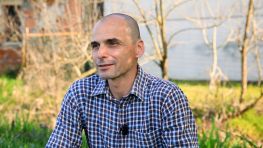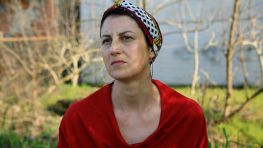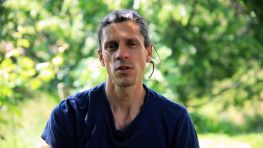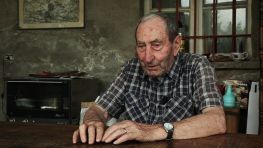 Roberto Marinone
Roberto Marinone Marco Paravicini Crespi
The Cascine Orsine, where the frogs still sing.
Marco Paravicini Crespi, tells us about the origins of the Cascine Orsine farm in Bereguardo, near the Pavia stretch of the Ticino. The family hunting estate, La Zelata, was converted into a farm at the behest of Giulia Maria Crespi and subsequently managed by her son Aldo Paravicini until his untimely death in 2020. Since then Marco has begun to take care of it in the name of continuity of values of respect for the balance between agriculture and the environment that his grandmother had already strongly desired.
Grandma Giulia Maria fell ill with cancer in the early 1970s and in Germany she had the opportunity to learn about Steiner's philosophy. The theme of food and agricultural production methods according to the then almost unknown dictates of biodynamic agriculture aroused particular attention in her. Back home she immediately undertook the conversion of the farm that the family had in the Pavia area, in the belief that it was necessary to make healthy food available not only to her family but to those who wanted it, produced according to principles that were as natural as possible. Since then Cascine Orsine have become a point of reference for all those who wanted to learn techniques, exchange ideas and experiences; a true cultural hub of natural agricultural practices.
Rice cultivation immediately assumed a fundamental role in the production of Zelata: in addition to being one of the symbolic products of the territory, it was also one of the most harmful to the environment. With the paradigm shift, chemical treatments have been eliminated as well as the use of synthetic fertilizers, replaced by manure from the company's cows. The company logo, a frog with the inscription "Where frogs still sing" bears witness to this trend reversal: from the deafening silence left behind by chemical products and dry cultivation, frogs, but not only them, have resumed live and thrive.
After fifty years it can be said that the project was not only the whim of a lady with large financial resources, but a successful agricultural reality, capable of becoming the point of reference and the origin of a movement of agricultural renewal in national level but not only.
Video table of contents
- The origins of Cascine Orsine: from hunting estate to farm
- From grandmother's illness to the discovery of Steiner's philosophy. Choosing to produce healthy food after recovery.
- The launch of the biodynamic company and expert advice: not for a commercial return but for the desire to produce healthy food.
- From the historic farmhouse to the construction of new stables and the dairy.
- The mark of the frog: "Where the frogs still sing." The damage of pesticides and the deafening silence.
- Zealousness and its nature was our place of play for us.
- The refusal of the compromises that I inherited from those who preceded me: product quality, respect for the land and the environment.
- Optimism in the future and in our way of doing agriculture: we were right and we produce value even outside the agricultural product.
- From the outset it was natural for us to try our hand at growing rice.
- The ecosystem function of the paddy field.
- We looked for suitable varieties: need for short cycles and to give the autumn-winter forage crops time to grow.
- Choice of varieties able to compete with weeds: Rosa Marchetti and Baldo.
- The need to experiment with techniques in an area that has a short history and precarious knowledge.
- Choosing the right technique for each type of land on 350 hectares of UAA.
- Closed cycle company and transformation, only the rice mill is missing. Wide range of products.
- Total control of the supply chain but problems in optimizing the use of resources. We are not specialized but we control everything internally.
- Biodynamic companies use the resources that the territory offers: the need to find a balance.
- A strongly natural landscape, almost nineteenth-century.
- Le Cascine Orsine, a place of agricultural and food culture wanted by the grandmother. The role of pioneers and disseminators.
- Skepticism about yields in rice cultivation, improvement: not just a business for rich gentlemen. The university world has also moved. much remains to be done.
- The reality of organic rice cultivation is now consolidated and produces value for companies. It is not only a lifestyle choice but it is also an entrepreneurial choice.
- Networking between producers: the Baraggia, small areas. Much remains to be done, there is a lack of broader coordination that offers visibility. We are few and isolated, we need fabric to connect distant territories.
- The goal of 25% of the organic required by the EU and the urgency of getting there in Northern Italy: we are at the beginning.
- Biodynamics is a niche within a niche: an unjustified persistence. We are a virtuous reality.
- Biodynamics is an advanced system not a return to the past: with its balance it minimizes imports and waste and is therefore more resilient than a conventional company.
- Realities that tell the story of the territory through products that have a strong brand and identity. An example of agricultural entrepreneurship to look at also from a commercial point of view.
- An invitation to universities: come and study not only yields but the positive and negative externalities of agricultural systems, studies to improve techniques and technologies. We too look to the future but in a sustainable way and with attention only to quality.
- Let's overcome prejudices and discover the substance behind our companies which are the flagships of the territory.
- The farmer has and must have a political role. But it is a conservative environment: the well-being of many families depend on conventional agriculture. The need to slowly move towards greater sustainability.
- The political role of companies like ours: disclosure to citizens and consumers on production dynamics to give value to quality products. Purchasing decisions aware of what is behind a product.
- The evolution of the clientele and the awareness of the theme of animal welfare but not of the needs of agriculture. Don't ride too much into the emotional aspect and danger of greenwashing.
- Climate change and drought: the need for conscious management.
- A plate of rice heals the spirit and the body, especially if you know where it comes from.
- Simple home cooking: risotto with vegetables from my childhood.
Interview information
Country: IT
Region: Lombardia
City: Bereguardo
Urls: Cascine Orsine
Document by: Luca Ghiardo
Video by: Luca Ghiardo
Created: 11-10-2022
Questo video fa parte del seguente archivio
Rice stories
Rice stories
Food is a fundamental resource for man and his health, both through the supply of nutrients and the ability to embody traits of human culture that play a leading role in our well-being.
Over time, each territory has built original ways in which to relate to the fruits of its land, enriching them with rituals, symbolic meanings and culinary customs. Much of these relationships have been lost following the years of the economic boom, with the exodus from the countryside to urban centers, with the advent of agriculture for mass production and ultimately with the globalization of markets and the consequent impoverishment of the heritage of biodiversity and ethnodiversity.
The purpose of this archive is to collect evidence relating to the main rice production area in Europe, that is the Po Valley, and to investigate, through the analysis of textual sources and testimonies collected in the field, both what survives of this heritage, and the ways in which which has evolved and reached us, paying particular attention to the explicit and implicit links that bind food and health.






